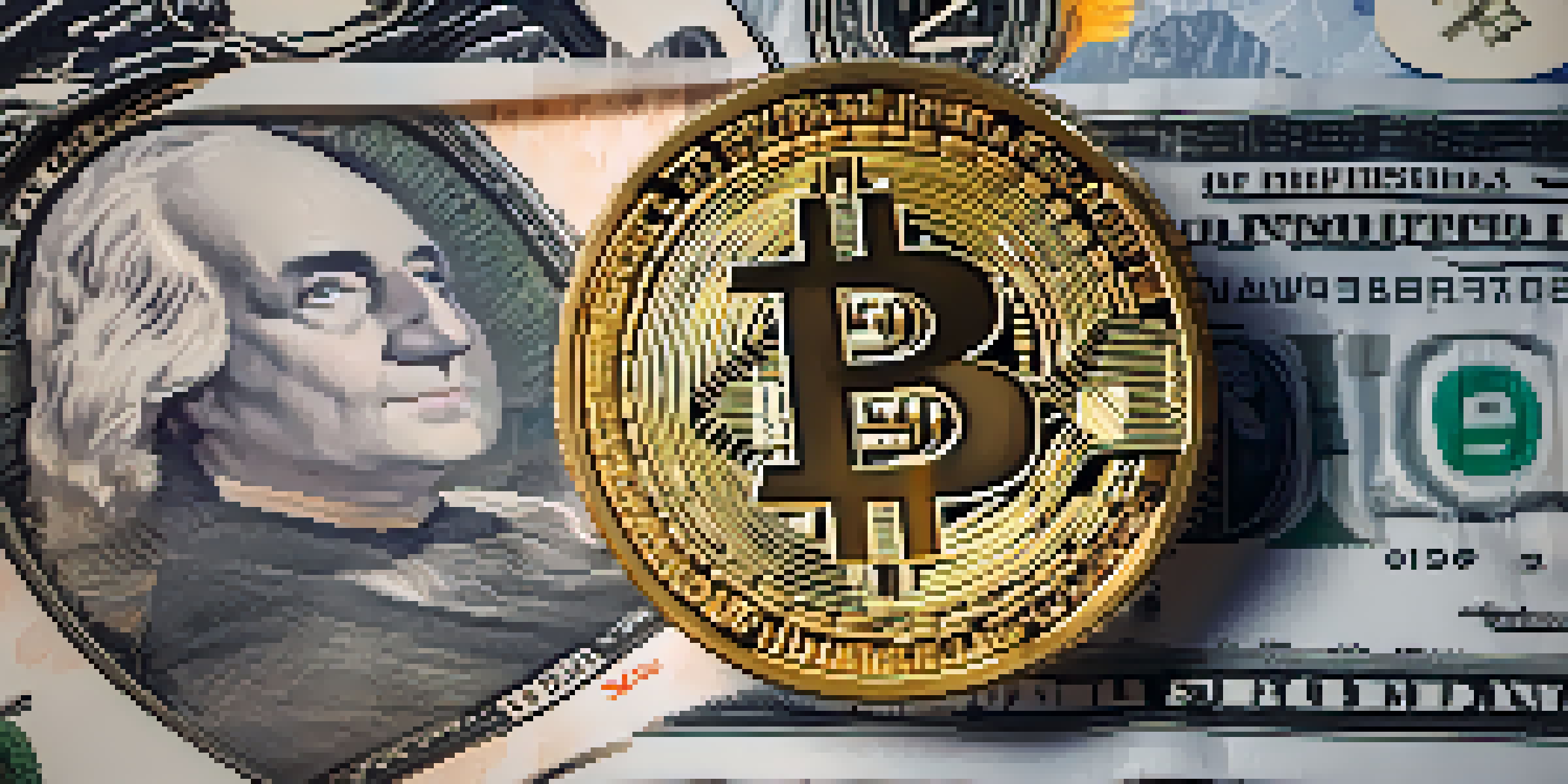Bitcoin and Inflation: Protecting Your Financial Future

Understanding Inflation and Its Impact on Currency
Inflation is a natural economic phenomenon that refers to the increase in prices over time. This means that the purchasing power of your money diminishes, making it harder to buy the same goods and services as before. For example, a loaf of bread that costs $2 today might cost $2.50 next year, which can strain household budgets.
Inflation is taxation without legislation.
Central banks often manage inflation through monetary policies, like adjusting interest rates. However, these measures can sometimes lead to unintended consequences, such as hyperinflation, where prices skyrocket uncontrollably. This is particularly concerning for savers who watch their hard-earned money lose value.
Understanding inflation is crucial for protecting your financial future, as it can erode savings and diminish wealth. People need to think about alternatives to traditional savings methods that may not keep pace with inflation.
What is Bitcoin and How Does it Work?
Bitcoin is a decentralized digital currency that allows people to send and receive money over the internet without the need for intermediaries like banks. It operates on a technology called blockchain, which is a public ledger that records all transactions securely. This transparency helps to build trust among users.

One of the unique features of Bitcoin is its limited supply; only 21 million Bitcoins will ever exist. This scarcity can make it an attractive option as a hedge against inflation, similar to precious metals like gold. As demand increases, the value of Bitcoin can potentially rise, offering a way to preserve wealth.
Inflation Erodes Purchasing Power
As prices rise over time, the purchasing power of money decreases, making it essential to consider alternative financial strategies.
By understanding how Bitcoin works, investors can better appreciate its potential role in a diversified financial strategy. It represents a shift towards a more independent and resilient form of currency.
The Relationship Between Bitcoin and Inflation
Bitcoin's design makes it an appealing option for those concerned about inflation. Unlike traditional currencies, which can be printed in unlimited quantities, Bitcoin's capped supply can help maintain its value even when inflation rises. This characteristic positions Bitcoin as a potential store of value.
In the long run, the value of a currency is determined by the value of its underlying assets, and Bitcoin is a new asset class that is gaining traction.
During periods of high inflation, many investors have turned to Bitcoin as a safeguard for their assets. For instance, in countries experiencing hyperinflation, such as Venezuela, Bitcoin has provided a means of preserving wealth when local currencies have failed.
This relationship between Bitcoin and inflation underscores the importance of considering alternative assets in financial planning. By exploring Bitcoin, individuals can take proactive steps to protect their financial future.
Advantages of Using Bitcoin as an Inflation Hedge
One major advantage of Bitcoin is its ability to operate independently of government policies. This can be particularly beneficial in times of economic uncertainty when trust in traditional financial systems wanes. Bitcoin offers a way to maintain control over your assets without relying on banks or governments.
Another benefit is the ease of access and transaction speed. Unlike traditional assets, Bitcoin can be bought, sold, and transferred quickly through various platforms. This immediacy can be crucial when navigating a volatile economic landscape.
Bitcoin as an Inflation Hedge
Bitcoin's capped supply and independence from traditional financial systems position it as a potential safeguard against inflation.
Additionally, Bitcoin’s potential for appreciation as demand increases can provide an attractive investment opportunity. Many see it not just as a hedge against inflation but also as a chance for significant financial growth.
Risks Associated with Bitcoin Investments
While Bitcoin presents exciting opportunities, it's essential to be aware of the associated risks. The cryptocurrency market can be highly volatile, with prices fluctuating dramatically in short periods. This unpredictability can be daunting for new investors who may not be prepared for sudden losses.
Regulatory uncertainty is another concern, as governments worldwide are still figuring out how to approach cryptocurrencies. Changes in regulation can impact Bitcoin's value and accessibility, making it critical for investors to stay informed.
Lastly, the lack of consumer protections in the cryptocurrency space means that users must exercise caution. It’s vital to research and choose reputable platforms to avoid scams or losses.
How to Get Started with Bitcoin Investment
Getting started with Bitcoin investment can seem overwhelming, but it's more straightforward than it appears. First, you’ll need to choose a reliable cryptocurrency exchange to buy Bitcoin. Popular options include Coinbase and Binance, which offer user-friendly interfaces for beginners.
After selecting an exchange, you will need to create an account and go through a verification process. This typically involves providing some personal information and confirming your identity. Once your account is set up, you can fund it and begin purchasing Bitcoin.
Risks of Bitcoin Investment
Investors must navigate the volatility and regulatory uncertainties associated with Bitcoin while ensuring the security of their assets.
Lastly, consider storing your Bitcoin securely to protect your investment. Many investors use digital wallets, which can be online or offline, to keep their assets safe from theft or loss.
The Future of Bitcoin in an Inflationary World
As inflation continues to be a pressing issue globally, the future of Bitcoin looks promising. Many analysts believe that the growing awareness of Bitcoin as a hedge against inflation will only increase its adoption. This could lead to more people considering Bitcoin as a viable alternative to traditional assets.
Moreover, as technology evolves and becomes more integrated into our daily lives, Bitcoin may find its place in the mainstream financial system. With more businesses accepting it as a form of payment, the utility of Bitcoin could bolster its value.

Ultimately, while no investment is without risk, Bitcoin offers a unique opportunity for those looking to protect their financial future against inflation. By staying informed and making educated decisions, investors can navigate this ever-changing landscape.